The United Kingdom is set to begin implementing a new migrant returns agreement with France within days, according to Reuters. The deal, aimed at curbing Channel crossings by enabling faster repatriation of migrants, marks a significant step in the ongoing efforts to manage irregular migration. Officials from both countries have been working closely to finalize the operational details, signaling a renewed commitment to bilateral cooperation on border control ahead of the busy summer period.
UK and France Set Timeline for Migrant Returns Agreement Implementation
The UK government has announced that it will begin enforcing the newly agreed migrant returns deal with France within the coming days. This move is set to streamline the process of repatriating individuals who arrive irregularly on British shores via the Channel, aiming to reduce unauthorized crossings and ease pressures on border facilities. Officials from both countries marked this agreement as a significant step toward enhanced cooperation on migration management.
Key elements of the agreement include:
- Fast-tracked returns: Expedited processing of migrants to ensure swift returns to France.
- Improved border patrol coordination: Joint efforts to monitor and control routes used by migrants.
- Shared responsibility: Clear protocols defining responsibilities for both nations regarding asylum claims.
| Phase | Expected Action | Timeline |
|---|---|---|
| Initial Rollout | Begin returns of recently arrived migrants | Within days |
| Operational Coordination | Increase joint patrols and surveillance | 1-2 weeks |
| Review and Adjust | Assess program efficiency and adjust protocols | 1 month |
Operational Challenges and Legal Considerations in Cross-Channel Migration Enforcement
The initiation of the UK-France migrant returns deal brings to the forefront significant operational hurdles that both nations must navigate. Ensuring swift and humane processing of returns requires robust coordination between border agencies and local authorities. Key challenges include managing the logistics of cross-channel transportation, addressing language barriers, and safeguarding asylum seekers’ rights during the return process. Additionally, limited infrastructure capacity at reception centers in France may lead to bottlenecks, further complicating enforcement efforts.
Legal considerations also stand as critical factors shaping the policy’s implementation. The deal operates within a complex framework of international law, including the 1951 Refugee Convention and the European Convention on Human Rights. Authorities must meticulously verify each returnee’s asylum claim to avoid breaching protections against refoulement. Concerns raised by human rights groups emphasize the need for transparency and accountability. Below is a summary of pressing legal and operational elements:
- Asylum Claim Verification: Ensuring thorough individual assessments prior to return
- Due Process Guarantees: Access to legal representation and appeal mechanisms
- Transport Coordination: Safe and dignified cross-channel transfers
- Capacity Constraints: Adequate facilities to handle incoming returnees in France
- Human Rights Safeguards: Compliance with international obligations and monitoring
Recommendations for Enhancing Bilateral Cooperation and Protecting Migrant Rights
To strengthen collaboration between the UK and France and ensure the dignity and protection of migrants, it is essential to adopt a multifaceted strategy built on trust and mutual accountability. Regular joint monitoring mechanisms should be established to oversee the implementation of the returns deal, ensuring transparency and adherence to human rights standards. Furthermore, enhancing communication channels between border enforcement agencies and migrant support organizations can create a more empathetic approach, reducing risks of abuse and expediting case resolution.
Investments in shared infrastructure and technology will streamline processing times and improve data sharing, creating more efficient and humane procedures. Below is a proposed framework highlighting key actionable items:
| Focus Area | Suggested Initiative | Expected Outcome |
|---|---|---|
| Monitoring & Evaluation | Joint oversight committee with civil society inclusion | Increased transparency and accountability |
| Communication | Regular inter-agency briefings and hotlines | Faster case processing and reduced misunderstandings |
| Infrastructure | Shared digital platforms for migrant data | Efficient returns and improved data security |
| Rights Protection | Guaranteed legal aid and welfare monitoring | Safeguarded migrant rights and wellbeing |
Future Outlook
As the UK prepares to initiate the migrant returns agreement with France in the coming days, both governments face heightened scrutiny over the deal’s implementation and its impact on migrants. Observers will be watching closely to see how the agreement shapes cross-Channel migration dynamics and whether it effectively addresses the ongoing challenges at the border.




